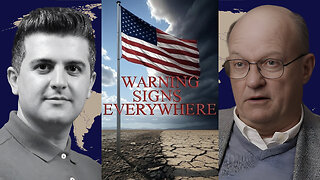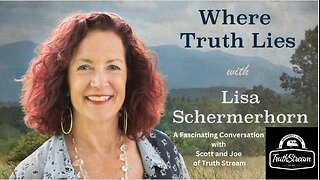Premium Only Content

Episode 3008: One Hour with Jesus: Charity & Almsgiving: 4th Week of Lent
One Hour with Jesus
Week 4: Charity & Almsgiving
Theme: Love of neighbor as the fruit of love for God
Duration: 1 Hour
Welcome back to One Hour with Jesus. We’ve traveled together through conversion, penance, and prayer. This week, we reflect on what all of those things must lead to: charity, the love of God lived out in love for our neighbor.”
Recap
• Week 1: Conversion: Turning our hearts to God, again and again.
• Week 2: Penance: Offering sacrifice and self-denial to free our souls for love.
• Week 3: Prayer: Entering into living communion with God.
This week, we ask: What is the fruit of that communion? How does our love for God show itself in daily life?”
Opening Prayer
“Heavenly Father, help us to love as You love, to give as You give, to forgive as You forgive. Amen.”
What Is Charity?
Definition & Key Point:
Charity is not mere kindness or philanthropy it is supernatural love. It is the love with which God loves, poured into our hearts through grace (cf. Romans 5:5).
St. Thomas Aquinas:
“Charity is the form, mover, mother, and root of all virtues.”
Distinguishing True Charity
• Not about feelings, but willing the good of the other.
• Not a substitute for truth it is truth in action.
• Not general kindness it is a supernatural virtue rooted in God.
Charity begins with loving God above all things, and then loving our neighbor for His sake.
Reflective Questions:
• Do you view charity as something optional, or essential to the Catholic life?
• Is your love for others rooted in convenience or sacrifice?
• Who in your life is God asking me to love more deeply or more patiently?
Gospel Reflection: Matthew 25:31–46
“I was hungry, and you gave me to eat… What you did for the least of these, you did for Me.”
This passage reveals how we will be judged not by intentions or words, but by acts of mercy. These are not nice extras, but divine encounters with Christ Himself.
1. The Context: The Final Judgment
This passage is known as the Parable of the Sheep and the Goats, but it’s not a parable in the usual sense. Jesus is not describing a fictional story He is prophesying what will actually happen at the end of time:
“When the Son of Man shall come in His majesty, and all the angels with Him, then shall He sit upon the seat of His majesty...” (v. 31)
This is a courtroom scene. Christ is no longer the suffering servant He is now the Judge of all nations, separating humanity as a shepherd separates the sheep from the goats.
2. The Standard of Judgment: Love in Action
What criteria does the Divine Judge use?
• Not theological knowledge.
• Not religious affiliation.
• Not eloquence in prayer.
But simply: Did you love Me in the least of My brethren?
“I was hungry, and you gave Me to eat; I was thirsty, and you gave Me to drink; I was a stranger, and you took Me in...” (vv. 35–36
This list, known in Catholic tradition as the Corporal Works of Mercy, becomes the measuring stick of eternal destiny.
3. The Mystery of Christ in the Poor
What’s astonishing is not just the list—but what Jesus says about Himself:
“As long as you did it to one of these My least brethren, you did it to Me.” (v. 40)
Here we find one of the deepest truths of Catholic social teaching:
• The poor are not simply people we help—they are Christ in disguise.
• Every act of love toward the vulnerable is an act of worship.
This isn’t poetic language. Jesus makes it clear that our eternity depends on how we treat the “least.”
4. A Warning Against Indifference
“Then He shall say to them also that shall be on His left hand: Depart from Me, you cursed, into everlasting fire…” (v. 41)
Why? Because they did nothing.
“I was hungry, and you gave Me not to eat…” (v. 42)
They aren’t condemned for hatred or cruelty but for neglect.
This is a powerful call to wake up from the sin of indifference to recognize that omission is just as serious as commission.
5. The Church’s Response: Corporal and Spiritual Works of Mercy
From this passage comes the tradition of the Corporal Works of Mercy:
1. Feed the hungry
2. Give drink to the thirsty
3. Clothe the naked
4. Shelter the homeless
5. Visit the sick
6. Visit the imprisoned
7. Bury the dead
The Church also teaches the Spiritual Works of Mercy, such as instructing the ignorant, counseling the doubtful, and forgiving offenses.
Both are needed.
6. This Gospel in the Lives of the Saints
• St. Teresa of Calcutta called the Gospel of Matthew 25 “the Gospel on five fingers.” She would hold up her hand and say, “You did it to Me.”
• St. Martin de Porres tended to the sick and the poor with tenderness, believing he was touching Christ in every suffering person.
• St. Francis of Assisi embraced the leper, once despised by him, as Christ Himself.
For these saints, mercy was not a ministry—it was a revelation.
7. Our Response Today
This Gospel invites us to a radical way of seeing:
• Every sick person: Christ.
• Every prisoner: Christ.
• Every unborn child: Christ.
• Every immigrant, addict, or homeless soul: Christ.
To love them is to love Him. To ignore them is to ignore Him.
This teaching isn’t “social justice.” It is eternal justice based on charity as the highest law.
Reflective Questions:
1. When have I encountered someone in need—and looked away instead of drawing near?
2. Do I truly believe that Christ is present in the poor, the sick, and the lonely?
3. How am I living out the Corporal Works of Mercy in my life?
4. What “least one” is God asking me to love more intentionally this week?
The Corporal Works of Mercy:
1. Feed the hungry
2. Give drink to the thirsty
3. Clothe the naked
4. Visit the sick
5. Shelter the homeless
6. Visit the imprisoned
7. Bury the dead
Jesus doesn’t say “thank you” He says, “You did it to Me.”
This radically changes how we see people: the poor, the sick, the forgotten they are Christ to us.
Reflective Questions:
• When have you encountered Christ in the poor or vulnerable?
• Do you believe Jesus is truly present in “the least of these”?
• What keeps you from responding when I see a need?
Saintly Wisdom
St. Vincent de Paul:
“Charity is certainly greater than any rule. Moreover, all rules must lead to charity.”
He devoted his life to the poor, organizing parishes and laypeople to serve those in need. For him, charity wasn't an activity it was a way of life.
Pope St. Gregory the Great:
“When we attend to the needs of those in want, we give them what is theirs, not ours.”
We are not the owners of our blessings we are stewards. What we give, we return.
St. Teresa of Calcutta:
“It is not how much we do, but how much love we put in the doing.”
Reflective Questions:
• Do you treat charity as duty or as delight?
• Do you believe that the poor have a right to my generosity?
• Which saint’s example inspires me most and how can I imitate them?
Almsgiving & Detachment
Almsgiving is not about money—it’s about the heart.
It helps free us from attachment to material things, which often block us from deeper communion with God.
Catholic Teaching on Almsgiving:
• It is one of the three pillars of Lent, along with prayer and fasting.
• It atones for sin (see Tobit 12:9).
• It makes room for grace by detaching us from wealth.
Why Detachment Matters
“You cannot serve both God and mammon.” – Matthew 6:24
The more we cling to things, the less we cling to God.
Almsgiving is an act of trust: “Lord, You will provide. I will give.”
Reflective Questions:
• What material comforts do I struggle to let go of?
• Do I give from surplus or sacrificially?
• How can I grow in detachment and generosity this Lent?
Practical Acts of Charity
Choose a Concrete Work of Mercy:
• Volunteer with a soup kitchen or food pantry.
• Support a crisis pregnancy center.
• Visit a lonely neighbor or an elderly parishioner.
• Call someone you’ve been avoiding.
• Offer a Mass for someone suffering.
Every act of mercy becomes a holy offering, when done in union with Christ.
Remember:
• Start small.
• Make it personal.
• Make it consistent.
Reflective Questions:
• What is one specific act of charity you can commit to this week?
• Who is Christ calling you to serve?
• How can you involve my family or parish in this mission?
Final Reflection and Closing Prayer
Final encouragement:
“Let us not love in word or speech but in deed and truth.” – 1 John 3:18
All prayer, all penance, all devotion must lead to love in action.
Let us go forth from this hour, not only with hearts turned to God, but with hands ready to serve Him in our neighbor.
Concluding Prayer:
“O Sacred Heart of Jesus, enkindle in us a fire of charity,
that we may see Your face in every person we meet.
May our prayer become love, and may our love bear eternal fruit. Amen.”
-
 10:32
10:32
Nikko Ortiz
15 hours agoFunniest Fails Of The Month
24.6K3 -
 1:03:43
1:03:43
Dialogue works
1 day ago $0.40 earnedCol. Larry Wilkerson: Warning Signs Everywhere: U.S. on the Verge of Disaster
16.1K8 -
 1:09:42
1:09:42
Mike Rowe
7 days agoHow Did THIS Dirty Job Make Tommy Mello A Billionaire?! | #447 | The Way I Heard It
88.6K20 -
 2:01:37
2:01:37
MG Show
18 hours agoTrump Says Soros Should be Charged with RICO; Bill Gates Pulls Out of Arabella Advisors
12.9K28 -
 1:19:55
1:19:55
TruthStream with Joe and Scott
1 day agoLisa, Michelle and Carole join Joe for Healing and Inspiration. Next healing will be on Aug 28th at Noon and 4pm eastern https://www.balancingbodyandsoul.com/?ref=TRUTHSTREAMSHOW
3.54K1 -
 1:14:00
1:14:00
Steve-O's Wild Ride! Podcast
6 days ago $1.88 earnedLilly Singh Talks S*x Education With Steve-O | Wild Ride #264
17.7K4 -
 52:48
52:48
Futures Edge: Finance Unfiltered with Jim Iuorio and Bob Iaccino
1 day ago $1.34 earnedTrump’s Latest Initiatives Explained
18.9K -
 4:36:31
4:36:31
FreshandFit
10 hours agoWhat Are Things Women Wished Men Knew About Them?
69.8K113 -
 2:04:11
2:04:11
Side Scrollers Podcast
18 hours agoCracker Barrel CANCELS Rebrand + OG YouTuber Has Brain Tumor + More | Side Scrollers IN STUDIO
33.1K5 -
 19:26
19:26
GritsGG
11 hours agoChat Picked My Hair Color! All Pink Loadout & Operator Challenge!
9.99K3